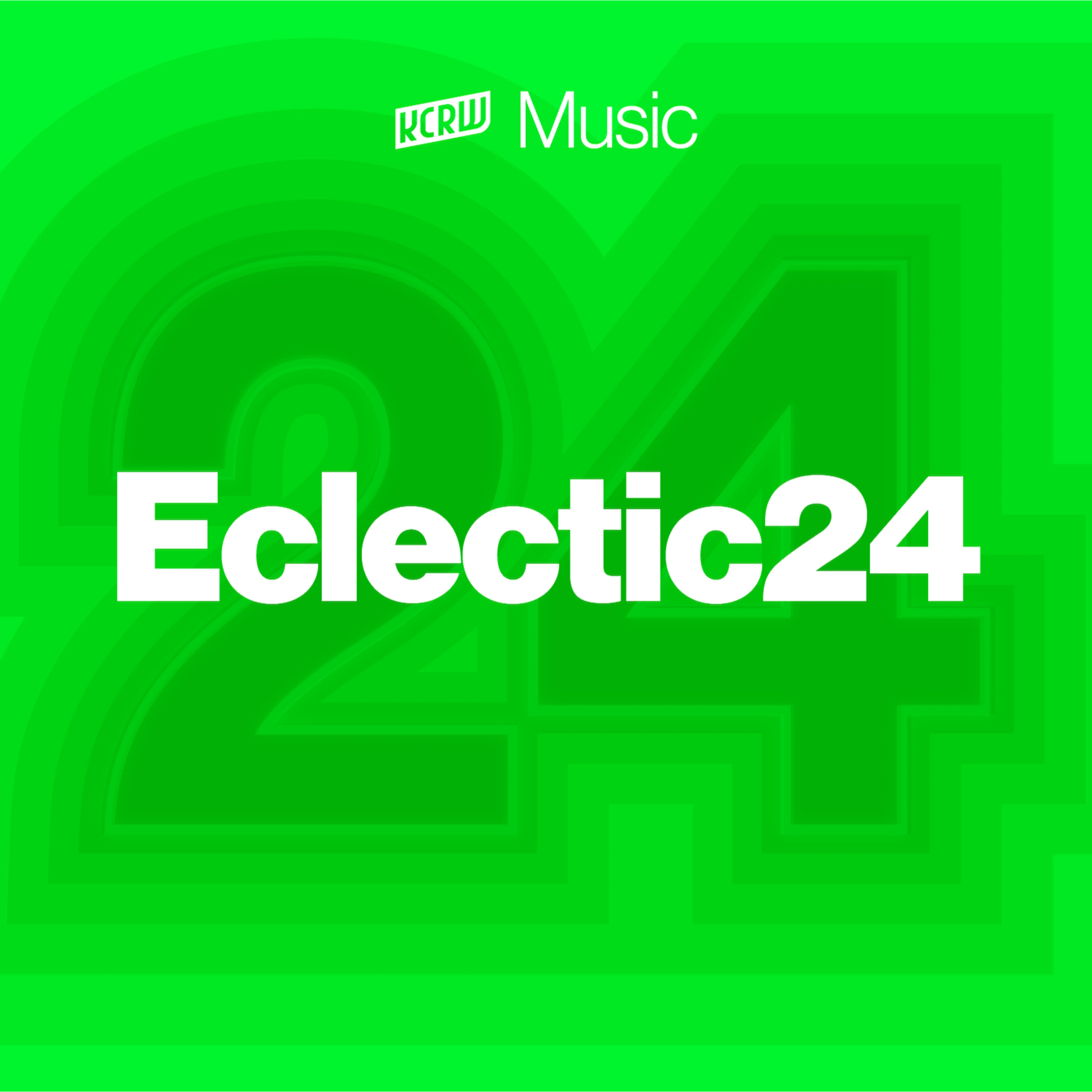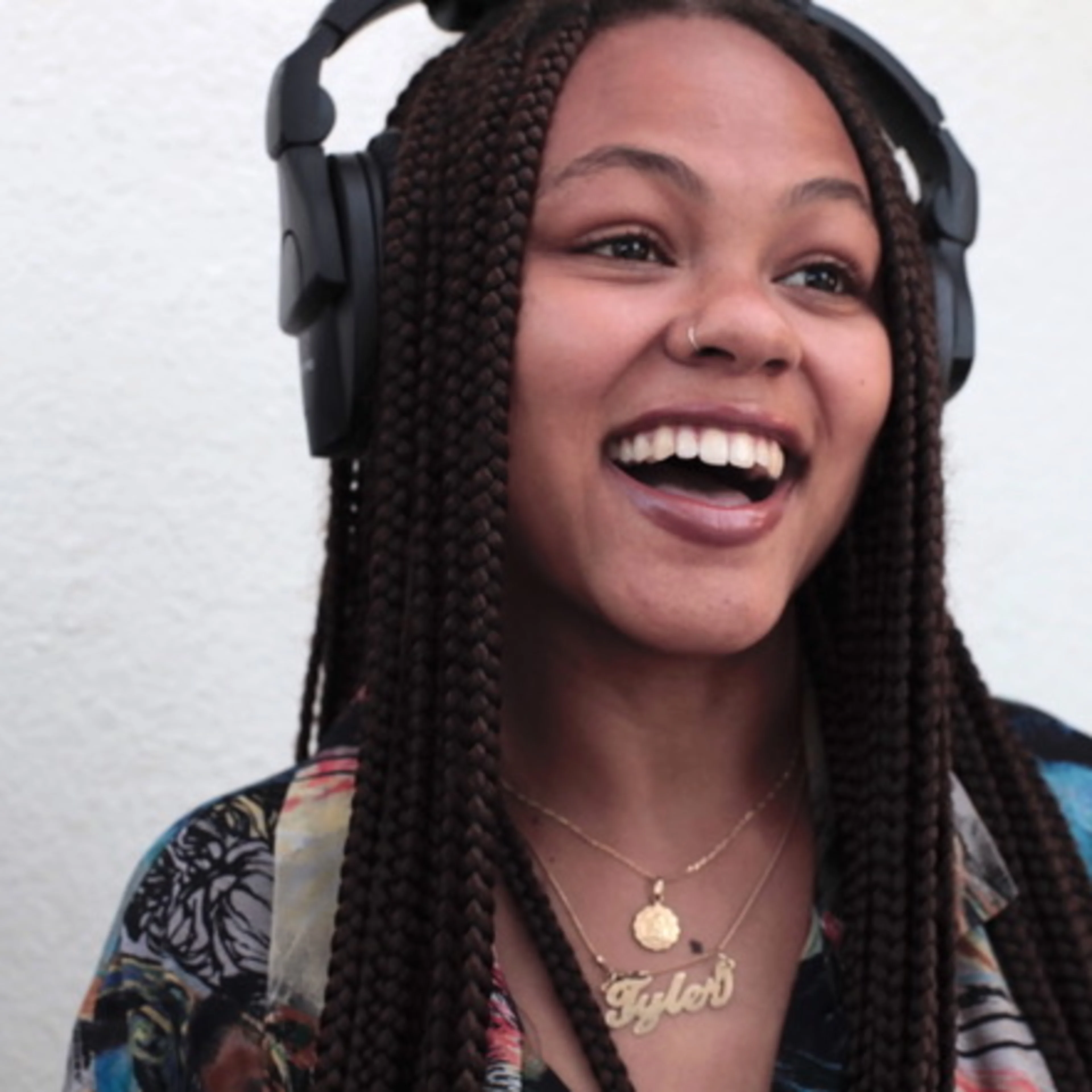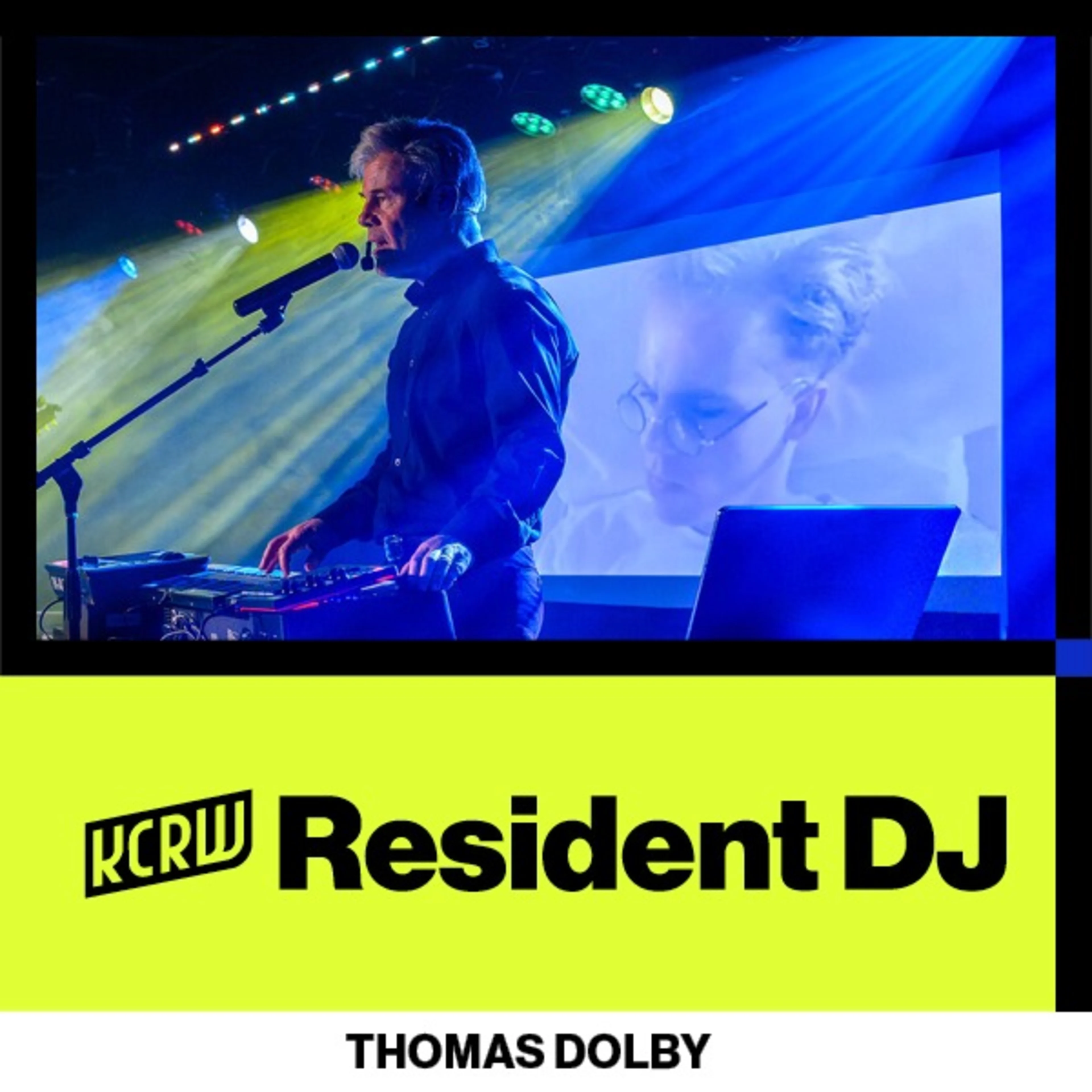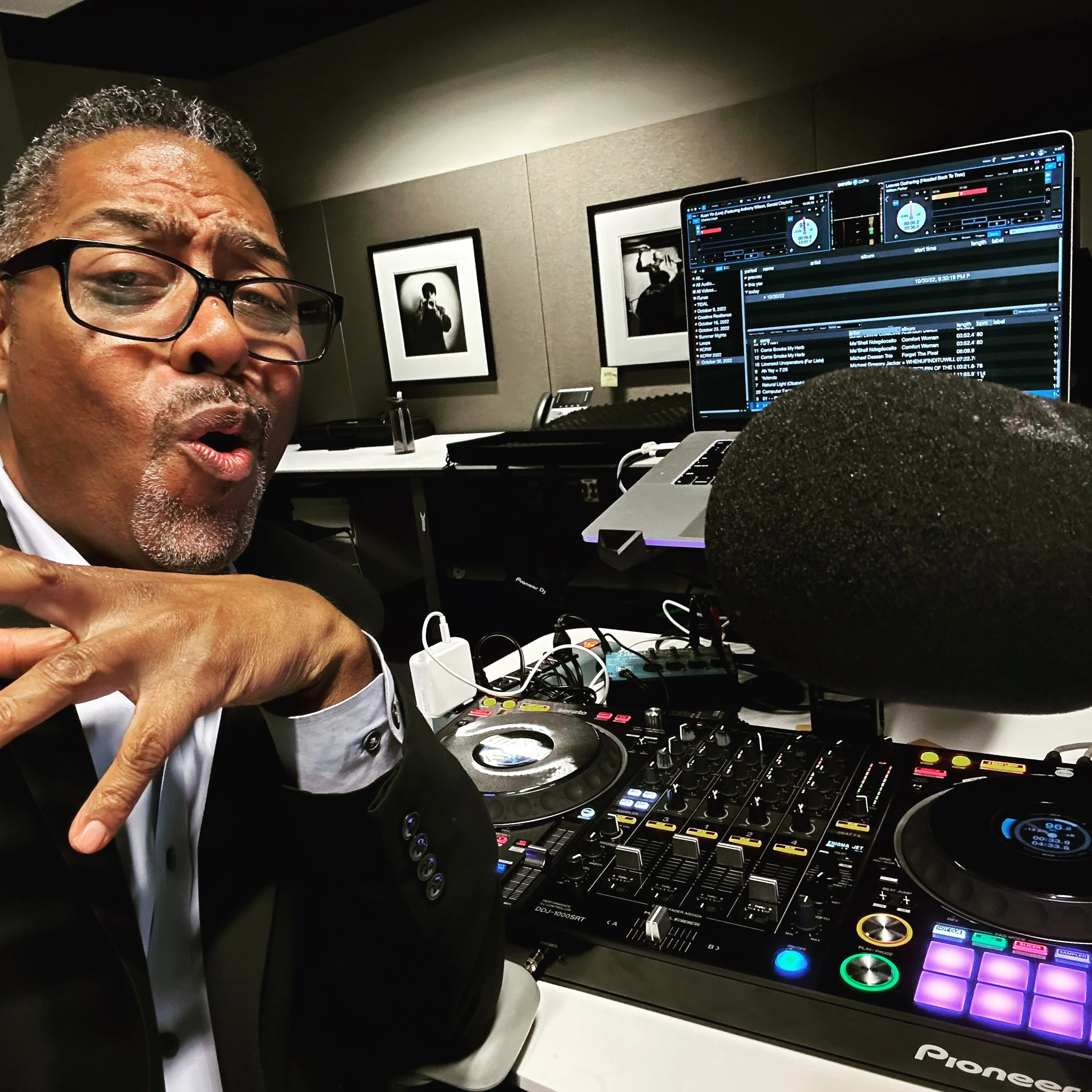Gustavo Dudamel

The LA Philharmonic's superstar music director Gustavo Dudamel shares his joyful passion for music -- and dedication to sharing it with the world -- in an intimate interview recorded backstage at the Walt Disney Concert Hall.
Photos: Dustin Downing
Transcript:
Jason Bentley: For KCRW, I'm Jason Bentley, and I am coming to you from a beautiful office space adjacent to the Disney Concert Gall. We are here in the offices of Gustavo Dudamel, who joins me now. Hello, how are you?
Gustavo Dudamel: Hello, big pleasure, big honor.
Jason Bentley: Thank you for having us to your office space. It feels like a very magical place to be.
Gustavo Dudamel: It's a very unique—it's a privilege to be in this beautiful room created by the genius of Frank Gehry.
Jason Bentley: Now, before you arrived, we were waiting here and I noticed an honorary football on the shelf.
Gustavo Dudamel: Ah yes! The Superbowl.
Jason Bentley: Yes the Superbowl, where many in our audience probably saw you last. Tell us about that experience, it must have been very exciting.
Gustavo Dudamel: Well look, yes, it was a very special experience. Especially because our children of the YOLA (Youth Orchestra Los Angeles) program, how big and unique and special it was for them. Life changing experience.
And working with these great artists, of course, Chris, that is a good friend of mine. And we were talking about this idea to bring the children, but also Bruno and Beyonce and all of that.
It is a privilege, I think, for them. Especially for these young people growing up in our program, YOLA, playing their instruments for years and now achieving this moment of recognition. I think more than…to be playing a concert because it was not a concert, it was a moment, but the recognition of this new generation full of positive things. Full of hope, you know, faith. This is the most important thing for us.
Jason Bentley: You mentioned YOLA, which is the Youth Orchestra of Los Angeles, which is an important project for you.
Gustavo Dudamel: Yes.
Jason Bentley: How do you inspire young people to truly embrace the music and the history and the culture? Because I think that for, especially for young people, it may not be in their “normal” solar system, but also might be very intimidating for them.
Gustavo Dudamel: Yeah…but we have to remember that, we have music around, all the time. Even if it's classical…well, classical, no. But even if it's pop, it's more popular. We have music.
Music is, I think, a natural language of us, of humans. And I think it's the music that cultivates, you know, that catches the attention of these children.
It's like, you only need to put in front of them, you know, the music and the sound, and they are convinced. You don't have to say anything. It's the music. It happened to me.
You know, when I was a child, they showed me all of these instruments and I decided to play one. They were not telling me the specific technical things of the music or of the instrument. It was only the sound and the beauty of this world, because we have to remember, what is music about?
Music is about feelings. It's about beauty. You don't need a specific language to understand something. And you can understand that in your own way, you know, because this is the wonderful and unique thing about music, that one sound or one song or one movement or one symphony can create so many different feelings, you know?
For me it's a little sad, for others, this music is a little bit more full of hope…the same music. So, it's such a powerful element of us, us, citizens of this world. That is why I always say that culture, you know, arts have to be a right for everybody. Because, it's about creativity, it's about beauty, we talk-- Because beauty is a concept that we use in our times as something very specific—physical. But beauty is something that goes beyond that. Beauty is feeling, it's a very deep concept.
And this is what you create, doing music. And especially, imagine, doing music together with others. Because you learn, of course, individually. But when you have the chance to play in a group, you are creating beauty together.
Jason Bentley: Yes.
Gustavo Dudamel: So--
Jason Bentley: And community.
Gustavo Dudamel: Exactly! So, what a beautiful example. How the world can be creating more harmony, you know? And less dissonance. This kind of analogy of how communities in the world have to work.
Jason Bentley: Take us into your practice and your passion as a conductor. For our audience, if you could define it simply, and elegantly, what you do as a conductor?
Gustavo Dudamel: Well. If you see me, I move my hands in front of an orchestra. (Chuckles)
But that is not the real thing. You share, you share the feeling of your soul with a hundred people—or more than a hundred people—sitting in front of you.
Imagine this: you arrive Monday, first rehearsal, you have a hundred people in front of you, sitting there, with different realities. They are coming for one reason; to play music. But they have their own realities.
Maybe one is tired, the other is more happy. You have all of these, this hundred people, maybe more. Then you have to catch that attention and then to bring them into your interpretation of one piece. I always respect that. I always respect that moment because you have to respect a lot the experience and the energy that they are giving all the time. You have to inspire them.
This thing, as a conductor, is very complex, because, it's not about knowledge. It's not about how you interpret it, or how much you know about the music. It's also how you connect with the musicians. Then we are talking about something psychological, philosophical at the same time, because you create an interpretation with your own love to the music, which you will share with them.
So, this action of music is, say, my life, my job. It's philosophical, psychological, artistically, of course, first place, and something else, that we don't know what is, that Garcia Lorca called, “Duende”. This magic thing in the artist that makes this person or this artist, specifically, different. This kind of a special thing.
Well, maybe it's long, it's very complex, to try to explain what I do, but it has complexity— It's very simple for me, because I have been living this world since I was 11 years old, and for me, it's natural what I do, and it's already inside of me to think and put that all the time on the stage.
Jason Bentley: I'm curious, you know, with different conductors, does everyone have a distinctive style of this communication and this relationship?
Gustavo Dudamel: Absolutely. Because, there is the interpretation and the, let's say the style of the conductor. The main thing, always, is the music that you have in front of you. We are secondary.
Because in the moment, in the beginning of the action of doing music, then, of course, the musicians—you need, you know, these people, because, if you move your hands alone, on stage, you will not produce any kind of sound.
So, you have the music, you have in front the musicians, that they will be the instrument—And, that is why, you know, to level all of these priorities in the music making, is so important. That is why, when I do a master class, or share with young conductors, I say, you know, you really have to think, you know, and to see all the levels of priorities -- how you arrive to the point of making music in the moment that you move your hand in front of an orchestra. Because you cannot improvise. You cannot improvise your personality, you cannot improvise your interpretation, you cannot improvise with so many people in front of you that have a lot of experience… So, it—it's a beautiful world.
Jason Bentley: Is there much diversity in that position? My sense is that it's, most often, white men.
Gustavo Dudamel: Well, no—there are women. We have a great woman that will take a wonderful position, Mirga Gražinyte-Tyla, that is our assistant conductor, and now she is going to be the music director of the Birmingham Symphony Orchestra in England.
So, a huge position where Simon Rattle was the new—he is the music director of the Birmingham Philharmonic…Agnes Nelson, Sakari Oramo, so many great conductors in the history, so, I think… She is an example of a woman that, you know, can do great music. So, of course, we have—music can be a very male, art. You know, this is coming with the history. But the last forty years, thirty years, you know, the life of music has been changing a lot. And, for example, I have some orchestras in Venezuela that there are more girls than are boys, for example. That is really beautiful. And you see more and more young female conductors doing great careers, so, I don't think it is a male thing, only.
Jason Bentley: We're speaking with Gustavo Dudamel on KCRW… I'd like to talk about the job associated with your passion and your creativity. I'm sure there are many layers to that, but describe your job and your priorities. Do you have to look at the orchestra as almost like a coach of a team, where you have to recruit people and keep the best talent coming through?
Gustavo Dudamel: It is like that. We are very open. This is an orchestra full of youth, you know, in the sense—I'm not talking about the age, I'm talking about the spirit of music making.
We have the privilege to receive here, when we have a position, an open position, the best players around the world. They always want to come to Los Angeles and to be a part of this family. So, that is a privilege for us, as a family, to have, you know, to have all these great people.
And of course, you know, the work, everyday, that we do—What I try to do is to avoid the routine. That is the way to keep youthful the, the, the moment of rehearse, the moment of to play a concert, even if it is a piece that is the same—And, I think that is attractive for all young musicians around the world, to, to have these kind of emotions, you know—to do music. Because sometimes, you know, we have arrived to a point where we play, you know, Beethoven 5 hundred times, you know, and, every time, you know, it's like, “Wow, oh my god, again?”
Jason Bentley: Yeah.
Gustavo Dudamel: But no, it's not again. Because, that is the infinite, the never-ending, way of music. The road of the music that is always new, and you have to find something new—not because you, you know, not because, “I want to do that.” No. It's because the music always asks you something different. And you have to share that with the new generations, because, it's not only to play good. It's not only to play perfect—We live a very pragmatic world, in that sense, you know? To be the best, and sometimes not to think, “Why?” We think only the “How?” question. But why we do this?
And that is what I share conducting the youth orchestras in Minnesota and around the world, in here, in Los Angeles, and also conducting all the professional orchestras all around the world. So, I think, we have to do, to create a more cultural world.
Jason Bentley: And challenging people—
Gustavo Dudamel: Challenging people, exactly.
Jason Bentley: Give us an example, in your programming, of how you avoid the routine, and keep things fresh and different? Because, of course, there's a give and take with people's expectations of certain programs.
Gustavo Dudamel: Well. Let's say that we combine our traditional repertoire with new music. This institution makes, I don't know, so many world premieres every year—this year more than 20. And what a message to the world. When you can, when you open the possibility, to young composers, to be played— that is the most, that is the biggest, the biggest drama for composers, that sometimes they don't have the chance, even in their life, to hear their pieces played with an orchestra.
And this orchestra always has been so open to these young composers. So, combining with this thing, bringing in the new generations—These communities that don't have access to, to this world… Because, also, we have to talk about that—Let's say, that music, classical music has been a very elitist symbol of art. It's because the history—it's not because it's something like specific now. It has been part of the history since the beginnings, you know, when the philanthropists were giving, you know, the things. And the big families or the kings, the kingdoms were—this was the life of music. But now, it's changing. Now it's changing because we cannot stay in a corner, because it's so big and full of possibilities, this world that you have to share. How we do? Now, well, bringing people here, but also going to the community with the orchestra. So, how we do also that? You know, bringing young musicians but also, a new generation audience? Also, going to the community with YOLA, with programs of education, so, there are so many things that create, you know, for this orchestra, a beautiful position.
As a symbol not of something that is far, far, far away from the reality of the community—this is an institution and an orchestra for the community. So, and, we do that combining with many things. With new music, with young people's concert, with children's concert, with new music programming… in our tours we bring YOLA, for example, with us, you know to share with the young musicians in other countries. So, thousands of things.
Jason Bentley: Let's talk about this community and your affinity for Los Angeles and we'll leave you with this question: Do you consider Los Angeles your home?
Gustavo Dudamel: Yes, of course. I still, you know, spend, I spend a lot of time in my country, Venezuela, because, with my--not with my program, but in the program where I grew up is El Sistema, created by Maestro Abreu of course, I have the orchestra and all of the children there.
But for seven years I feel Los Angeles as home. And this is a community, wow, where, you know, you can build so many things. And it's always open. We have to see the history of Los Angeles. How many great artists moved to Los Angeles, all the time. And all of the possibilities here.
It's an inspirational place. It's a place full of light, of course, but, not only physically, also in the spirit. And, I feel a lot of connections with, with, with my own land, you know? Because, this kind of spirit is beautiful, and I love to be here. I have, you know, I extended my contract last year until 2022 because I feel so happy here.
Jason Bentley: We're speaking with you just a couple of days after the Oscars, which is an important symbol of Hollywood and a part of Los Angeles. This is a time when great film composers are celebrated; in particular, John Williams. The Oscar went to Ennio Morricone this year, but you have a friendship with John Williams and I wanted to mention you had a special experience recently—
Gustavo Dudamel: Ah, with Star Wars, yes!
Jason Bentley: (Laughs)
Gustavo Dudamel: That was a big surprise, when John called me to say, “Look, Gustavo, can you join me to conduct part of this score?” And I was like, “Are you joking or what? This is a dream! Of course, I'll go!”
And it was a great experience. Especially--for me it was amazing—but for my son, Martin. He came with me to the session, and he knows every—he's four years old, but he knows every single detail in all Star Wars movies, and he was so happy there, you know, listening to that. You see, I think John Williams is…He's the Mozart of our times. He's a genius. And film music is so wonderful, so deep, and so great that, you know…I'm so happy to have be—You know, I had the chance to write a score for a film, like, three years ago, four years ago, and I had the advice of John Williams, but so many of them have been you know our reference. I am so happy that Morricone got the Oscar, you know.
Jason Bentley: That was his first!
Gustavo Dudamel: The first one! And I think, so many beautiful, such great music that he wrote; The Mission, Cinema Paradiso… and, oh! So many—it was beautiful to see that. But also, it was beautiful to see him thank John Williams at the beginning of the speech. How beautiful, how important is John for the music world?
Jason Bentley: Well, Gustavo Dudamel, what a pleasure to sit with you, today—
Gustavo Dudamel: Big pleasure for me.
Jason Bentley: It was wonderful to be around your energy and in your space, here—
Gustavo Dudamel: This is your house, so—
Jason Bentley: (laughing) You're gonna regret that you said that when I come knocking later--
Gustavo Dudamel: No, don't worry, I don't—
Jason Bentley: Thank you for spending some time with KCRW and we wish you all the best.
Gustavo Dudamel: Huge pleasure. thank you very much.
Jason Bentley: So tell me, what would you say you would like your legacy to be?
Gustavo Dudamel: Well, that is difficult to answer because I'm still at the beginning of this, even if have been 20 something years conducting. I'm still young to say what I want to achieve because what I want to do is to keep doing this, to keep living the world of music as I have been doing, you know. With a lot of intensity, with a lot of love.
I think the secret to making things special is to love what you do and that is my focus, to every day say “thank you and this is a gift for me”. I think maybe if I can say something, it's to spread music, is to make music part of every children known as a professional thing if not as a beauty, as a concept of beauty for them, culture to our children, to our new generations. I'm sure we can create a better world, you know. Giving more art and more culture to our new generations. I'm coming from this beautiful and unique program El Sistema in Venezuela where we have more than 700 000 children right now, its huge. But you see the change, you see how their reaction of as a citizens of a community change, you know.
Playing in an orchestra, singing in a choir and it's not about, you know, “ok we want to everybody play”, no. It's to have them to have access to this beautiful, deep and amazing world of music. So if I think something, I would love that everybody have that chance.
Show Credits
Continue Listening
See All- Morning Becomes Eclectic
More Shows
Eclectic24
KCRW's all-music channel blending the collected talents and tastes of all KCRW's DJs into a single voice streaming 24 hours a day.Live From
Intimate performances, fresh sounds, and candid conversations.Tyler "Boogie" Boudreaux
Part wax. Part digital. Pure heat.Resident DJ
Thomas Dolby drops original mixes just for KCRW. Every Friday in December.
LeRoy Downs
Exploring the multitudes contained within jazz.





